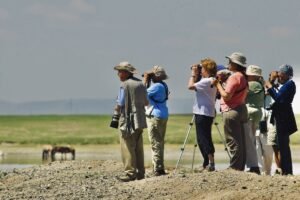BASIC (Brazil, South Africa, India, China) countries and the climate change

Joint Statement issued at the Conclusion of 29th BASIC countries (Brazil, South Africa, India, China) Ministerial Meet on Climate Change at Beijing, China on 25th-26th October 2019
Following is the Joint Statement issued today at the Conclusion of 29th BASIC Ministerial Meet on Climate Change:
The 29th BASIC Ministerial Meeting on Climate Change was held in Beijing, China, on 25th-26th October 2019. The meeting was chaired by H.E. Mr. LI Ganjie, Minister of Ecology and Environment of the People’s Republic of China, attended by H.E. Mr. XIE Zhenhua, Special Representative for Climate Change Affairs of China, and
H.E. Mr. Prakash Javadekar, Minister for Environment, Forest and Climate Change and Information and Broadcasting of the Republic of India, Mr. Roberto Castelo Branco, National Secretary for International Relations, Ministry of the Environment of Brazil, and Mr. Maesela Kekana, Chief Director of International Climate Change Relations and Negotiations of the Ministry of Environment, Forestry and Fisheries of the Republic of South Africa. In line with the ‘BASIC-plus’ approach, H.E. Ammar Hijazi, Ambassador of the state of Palestine, on behalf of the Chair of the Group of 77 and China, and Mr. Mauricio Carabelli of Chile, on behalf of the incoming Presidency of COP25 also attended the meeting as Guests.
BASIC Ministers expressed their concern for the global challenge of climate change and its adverse effects, and confirmed their commitments to multilateralism in order to address the issue and to foster climate resilience and promote greenhouse gas emissions reduction, low-carbon and sustainable development, with a view to collectively working towards preparedness of international community for the wellbeing of all. Ministers underscored that all parties should jointly defend the international system underpinned by the United Nations, in accordance with the principles of equity, common but differentiated responsibilities and respective capabilities (CBDR-RC), in the light of different national circumstances. Unilateralism and protectionism undermine the open and free international trade system and the prospect of global economic development and growth, which will end up with damaging global efforts against climate change. It is imperative to focus on safeguarding the multilateral process and the fulfillment of commitments.
Ministers emphasized the faithful and comprehensive implementation of the Paris Agreement, in particular of its goals and principles, and underlined the importance of a full, effective and sustained implementation of the United Nations Framework Convention on Climate Change (UNFCCC), its Kyoto Protocol and its Paris Agreement, in accordance with the principles of equity, common but differentiated responsibilities and respective capabilities (CBDR-RC), in the light of different national circumstances, as well as the nationally- determined nature of the Paris Agreement. They emphasized that global climate action should promote climate justice by recognizing the fundamental equality of all people in accessing economic growth and sustainable development. The BASIC Ministers reaffirmed and emphasized the need for people’s participation and climate friendly lifestyles for addressing the challenge of climate change acknowledging that Paris Agreement embodies and calls for sustainable lifestyles and consumption patterns.
Ministers highlighted that developing countries, including BASIC countries, notwithstanding the multiple challenges including food security, poverty eradication, and insufficient and uneven progress of domestic development, have been implementing ambitious climate action based on their national circumstances in the context of sustainable development, and have achieved great progress with significant contribution to global efforts in combating climate change. In 2018, China has reduced carbon dioxide emissions per unit of GDP by 45.8% from the 2005 level, increased the share of non-fossil fuels in primary energy consumption to 14.3%. South Africa has recently implemented carbon tax, and announced massive renewable energy program in its latest electricity plan. India has already achieved 21% reduction in emission intensity of GDP in 2014 compared to 2005 levels, thereby achieving its pre-2020 voluntary target. In 2015, Brazil had already achieved a 58% emission reduction in the business as usual scenario set for its NAMAs, thereby overachieving its target of 36%- 39% reductions set for 2020.
Ministers noted UN Climate Action Summit and its strong political signal of upholding multilateralism, implementing the Paris Agreement, and enhancing ambitions of action and support. BASIC countries actively engaged and contributed, and are ready to further strengthen international cooperation to explore solutions which are cost-effective and with lower risks, such as nature-based solutions, and technology innovation in industry transition.
Ministers expressed their appreciation to the Polish Presidency’s contribution to the conclusion of the bulk of the Paris Agreement Work Programme (PAWP). They appreciated Costa Rica for hosting Pre-COP25 to promote political dialogue on specific issues. The Group pledged their full support to the incoming Chilean Presidency, and highlighted that the key outcome of COP25 will be to conclude negotiations on robust rules to ensure environmental integrity under Article 6 of Paris Agreement and to achieve progress on climate finance which is one of the key enablers for developing countries to implement ambitious climate actions. They committed to working with all other Parties for the success of COP25 in an open and transparent, consensus-based and party- driven manner.
Ministers valued the 187 ratifications of the Paris Agreement to date, called on all remaining Parties to ratify, and welcomed the implementation of the Agreement in the post-2020 period. The Group also underscored Kyoto Protocol as the significant milestone in the multilateral climate process. Ministers also welcomed the 134 ratifications, to date, of the Doha Amendment to the Kyoto Protocol and recalled that only 10 acceptance instruments are outstanding for the amendment to enter into force. They urged the Parties that have not yet ratified the Doha Amendment to do so as soon as possible, striving for its prompt entry into force before COP25.
The Group highlighted the substantial gaps not only in mitigation, but also in adaptation and support provided by developed countries to developing countries in the pre-2020 period. They stressed that these gaps should not be transferred to the post-2020 period to present additional burdens on developing countries. They urged developed countries to take urgent actions to close the gaps, including revisiting their targets on mitigation under the Convention and the Kyoto Protocol, and fulfilling their commitments of providing support to developing countries.
Ministers underscored that as developing countries are the most adversely affected by climate change, adaptation is a key imperative but is neglected with imbalanced allocation of resources compared to mitigation. They reiterated that balanced allocation should be made for adaptation and mitigation in terms of support provided by developed countries, including through Green Climate Fund (GCF). The Group encouraged other fora, including the Global Commission on Adaptation to play their part in supporting developing countries on adaptation. They emphasized that it is critical to dedicate a share of proceeds from ITMOs transactions under Article 6 to fund adaptation in developing countries.
Ministers underlined their commitment to taking ambitious actions to implement their NDCs. They stressed that action and support are integral in terms of ambition, and the ambition of support by developed countries should match the ambition of action by developing countries. Developed countries shall provide new and additional, sustained, predictable, adequate and timely finance, technology development and transfer and capacity-building support to developing countries, open markets and carry out practical technological cooperation, which serve the basis for mutual trust and important conditions for the comprehensive and effective implementation of the Paris Agreement.
Ministers expressed their deep concern on the insufficiency and inadequacy of the support provided by developed countries to date, and underlined that the climate finance should be new, additional, and with significant public funded component. They urged developed countries to fulfill their climate finance commitments of providing USD 100 billion annually by 2020 for developing countries in a transparent and grant-based manner.
Ministers urged developed countries to propose the new collective quantified goal on finance as soon as possible, including detailed roadmap and timetable. The goal should be from a floor of USD 100 billion per year, significantly publicly funded and of greater transparency. The 2020 deliberations should draw lessons from the experience of meeting the USD 100 billion pledge, be informed by the needs and priorities of developing countries, and be adequate to meet the ambition of action of developing countries. In this regard, they stressed the importance of establishing a structured deliberation within the UNFCCC, in order to conclude this work in a meaningful and timely manner.
Ministers noted with concern the significant gap in aspects including funding scale, eligibility and policy- making of the GCF and the Global Environment Facility (GEF) from the need of developing countries. They noted of the contributions made by some developed countries in the first replenishment of the GCF, and urged the other developed countries to make speedy and robust contributions, to ensure the first replenishment doubles the initial resource mobilization pledge in real terms.
The Group highlighted that providing information on transparency of support, including its predictability, is a key component of the Enhanced Transparency Framework. In this regard, Ministers urged developed countries to engage in discussion to formulate clear guidance for the biennial communication which has common tables for communicating such information, referred to Article 9.5 in a positive and constructive manner.
Ministers underscored the importance of concluding the discussions on Article 6 of the Paris Agreement, in accordance with the mandates and principles set out in the Agreement and the accompanying decision, including ensuring environmental integrity and avoiding double counting. They restated that decisions on other subjects should not pre-empt discussions under Article 6, and the issues should be addressed in a balanced and inclusive manner.
Ministers expressed that the rules and governance structures for cooperative approaches under Article 6.2 shall be multilaterally agreed and applicable to all Parties, and shall ensure that all transactions are based on actual
mitigation efforts, consistent with Article 2. A robust accounting system shall be put in place, which shall have flexibility to accommodate different types of NDCs and a central log to register all transactions.
Ministers stated that the design of the mechanism under Article 6.4 shall be conducive to public and private sector involvement and avoid the creation of unnecessary obstacles to investment, provided that environmental integrity is ensured. Appropriate approaches, including corresponding adjustment and other possible means, should be explored to this end. Under no circumstances is the nationally determined nature of commitments and the bottom-up character of the Paris Agreement to be changed. They also stated that the ability of the climate change regime to ensure the appropriate transition of the CDM to the mechanism under Article 6.4 will be key to securing continued engagement of the public and private sectors in mitigation action.
Ministers welcomed the review of the Warsaw International Mechanism for Loss and Damage associated with Climate Change Impacts based on the mandates, and emphasized the need to address loss and damage on the basis of equity and in accordance with the principles of CBDR-RC, the relevant provisions of the Paris Agreement and COP decisions.
Ministers reiterated that the UNFCCC process remains the preeminent international forum for addressing matters related to climate change, and other fora serve as contributory supplement under the guidance of its principles and spirit. Ministers noted the work of International Maritime Organization (IMO) and International Civil Aviation (ICAO) on reduction of GHG emissions, and underlined that the work being undertaken must comply with the key principles of the UNFCCC process, in particular the principle of Equity and CBDR-RC.
Ministers hailed the 10th anniversary of the BASIC Group and agreed to further strengthen the solidarity and cooperation among the four countries. In this context, they committed to jointly promote South-South cooperation, providing assistance as capabilities allow to enhance the capacities of other developing countries in addressing climate change. They reiterated their unequivocal support to the State of Palestine, as the Chair of the Group of 77 and China, with a view to strengthening the unity of the Group and advancing the common interests of developing countries.
Ministers welcomed the offer of India to host the 30th BASIC Ministerial Meeting.
October 27 , 2019














